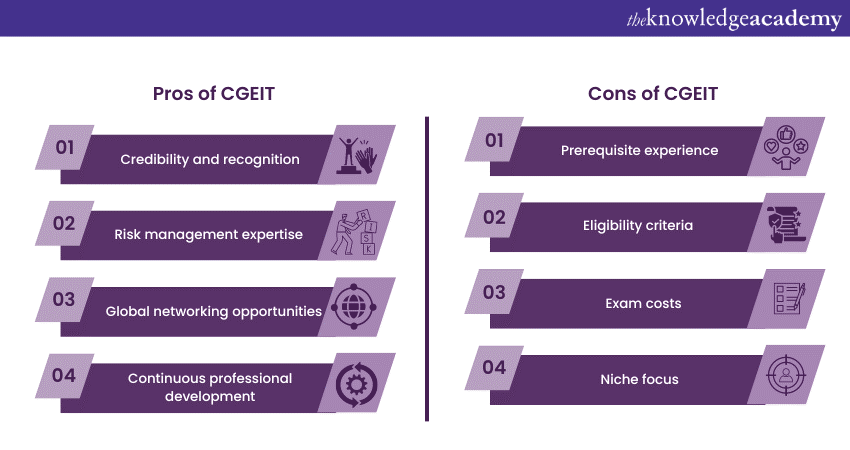We may not have the course you’re looking for. If you enquire or give us a call on +0800 780004 and speak to our training experts, we may still be able to help with your training requirements.
Training Outcomes Within Your Budget!
We ensure quality, budget-alignment, and timely delivery by our expert instructors.

Let’s say that you are an experienced IT professional looking to elevate your career. You’ve come across the CGEIT Certification and are pondering, “Is CGEIT Worth it?” This comprehensive blog aims to address that very question.
By examining the details of the CGEIT certification, we will explore its value, benefits, and potential return on investment. Be it considering this certification or seeking to understand its impact, this blog will provide you with the insights needed to determine, “Is CGEIT Worth it?” for your career advancement.
Table of Contents
1) What is CGEIT?
2) Pros and Cons Analysis
a) Pros of CGEIT
b) Cons of CGEIT
3) Conclusion
What is CGEIT?
CGEIT is an acronym for Certified in the Governance of Enterprise IT. It's a globally recognised certification offered by the Information Systems Audit and Control Association (ISACA). It is designed for professionals who specialise in IT governance, risk management, and strategic alignment. CGEIT is considered a highly valued certification in the IT industry, making it an essential credential for individuals seeking to make their careers in IT governance.
Although CGEIT focuses on equipping professionals with the knowledge and skills to effectively align IT with business objectives, it’s not limited to a specific sector or industry. It is applicable across various domains, including government agencies, financial institutions, healthcare organisations, and private enterprises. It goes beyond technical knowledge and dives into the realm of strategic decision-making and risk management.

Pros and Cons Analysis
As with any other professional certification, often individuals contemplating the pursuit of a CGEIT credential find themselves asking, Is CGEIT Worth it? Making an informed decision requires a thoughtful examination of the pros and cons associated with attaining this esteemed certification. Let’s first discuss the benefits of CGEIT:
1) Pros of CGEIT
a) Credibility and Recognition: CGEIT is globally recognised and respected in the IT industry. Holding this certification enhances an individual's credibility and validates their expertise in IT governance, elevating their professional standing among peers and employers.
b) Career Advancement: CGEIT opens doors to lucrative career opportunities in various sectors. Many organisations value CGEIT-certified professionals to lead their IT governance initiatives, thus presenting candidates with exciting leadership roles and potential career advancements.
c) Strategic Decision-making: CGEIT equips professionals with a deep understanding of aligning IT strategies with business objectives. This knowledge enables them to contribute meaningfully to the organisation's strategic decision-making process, making them valuable assets in driving business success.
d) Risk Management Expertise: The certification emphasises risk management principles, empowering CGEIT holders to identify and mitigate IT-related risks. Their ability to ensure data security and compliance with regulations is highly sought after in today's complex technological landscape.
e) Global Networking Opportunities: Joining the CGEIT community provides global networking opportunities. This networking opportunity promotes knowledge sharing, collaboration, and exposure to best practices in IT governance.
f) Increased Earning Potential: CGEIT certification often translates to higher earning potential. Employers recognise the value of certified professionals and are ready to offer competitive compensation packages in order to attract and retain top talent.
g) Continuous Professional Development: CGEIT-certified individuals are required to engage in Continuing Professional Education (CPE) to maintain their certification. This commitment to ongoing learning ensures that CGEIT holders stay updated with the latest trends and developments in IT governance.

2) Cons of CGEIT
Below mentioned are some of the main challenges of CGEIT:
a) Time and Effort: Preparing for the CGEIT exam requires a significant amount of time and effort. Candidates need to study diligently to grasp the diverse concepts and frameworks covered in the exam syllabus.
b) Exam Costs: Registering for the CGEIT exam incurs certain costs, which may be a deterrent for some individuals.
c) Prerequisite Experience: While there are no specific prerequisites to sit for the CGEIT exam, candidates are encouraged to have relevant work experience in IT governance-related roles. This may pose a challenge for entry-level professionals looking to obtain the certification.
d) Commitment to Recertification: CGEIT certification requires recertification every three years. This involves earning a specified number of CPE credits, which might be an added responsibility for professionals with busy schedules.
e) Eligibility Criteria: CGEIT certification requires some specific eligibility criteria, which include a minimum number of years of relevant work experience and completing the rigorous CGEIT examination. Candidates are also required to adhere to ISACA's code of professional ethics and CPE requirements to maintain the certification's validity. A minimum of 120 CPE hours is also mandatory for CGEIT.
f) Niche Focus: CGEIT is specialised in IT governance, which means its value sometimes may be limited for individuals seeking broader certifications covering diverse IT domains.
Lead your organisation’s security initiatives by joining our CISM Certified Information Security Manager Course
Conclusion
In conclusion, the question “Is CGEIT Worth it?” hinges on your career aspirations and the value you place on governance expertise. This certification can significantly enhance your professional standing and open doors to advanced IT opportunities. By investing in CGEIT, you’re not just gaining a credential; you’re positioning yourself as a leader in the tech landscape.
Transform your career and your organisation by investing in our CGEIT Training (Certified In The Governance Of Enterprise IT).
Frequently Asked Questions

The CGEIT certification stands out from other IT governance certifications by focusing on enterprise IT governance at a strategic level. It equips professionals with skills to align IT with business goals, unlike certifications that focus more on operational aspects.

The CGEIT certification is valid for three years. To maintain certification, professionals must complete continuing professional education (CPE) hours and pay the required annual maintenance fees.

The Knowledge Academy takes global learning to new heights, offering over 30,000 online courses across 490+ locations in 220 countries. This expansive reach ensures accessibility and convenience for learners worldwide.
Alongside our diverse Online Course Catalogue, encompassing 19 major categories, we go the extra mile by providing a plethora of free educational Online Resources like News updates, Blogs, videos, webinars, and interview questions. Tailoring learning experiences further, professionals can maximise value with customisable Course Bundles of TKA.

The Knowledge Academy’s Knowledge Pass, a prepaid voucher, adds another layer of flexibility, allowing course bookings over a 12-month period. Join us on a journey where education knows no bounds.

The Knowledge Academy offers various CGEIT Training, including the CGEIT Training (Certified in the Governance of Enterprise IT). These courses cater to different skill levels, providing comprehensive insights into CGEIT Jobs.
Our IT Security & Data Protection Blogs cover a range of topics related to CGEIT, offering valuable resources, best practices, and industry insights. Whether you are a beginner or looking to advance your Information Technology (IT) and Data Protection skills, The Knowledge Academy's diverse courses and informative blogs have got you covered.
Upcoming IT Security & Data Protection Resources Batches & Dates
Date
 CGEIT training (Certified in the Governance of Enterprise IT)
CGEIT training (Certified in the Governance of Enterprise IT)
Thu 13th Mar 2025
Thu 5th Jun 2025
Thu 11th Sep 2025
Thu 6th Nov 2025







 Top Rated Course
Top Rated Course


 If you wish to make any changes to your course, please
If you wish to make any changes to your course, please


